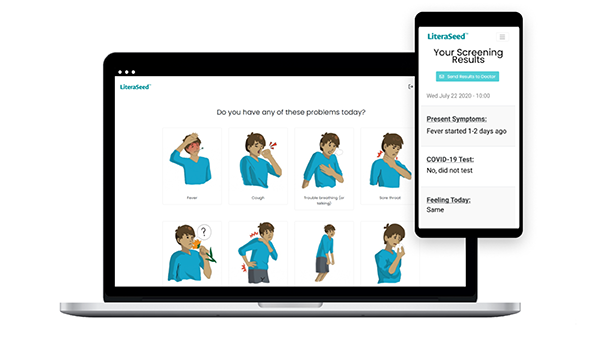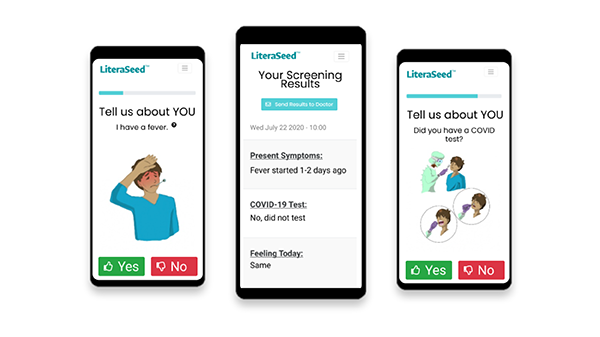The web‐enabled, smartphone-based LiteraSeed platform empowers patients with a visual guide to help them describe symptoms, even if the patient does not know the words in English.

LiteraSeed founder, Aziza Ismail, an Arizona State University (ASU) graduate, was inspired to develop technology to improve health literacy due to such a situation in her family, many of whom are immigrants and speak English as a second language. Miscommunication due to language barriers was among the factors that led to the untimely and preventable death of her young cousin, who died while in a hospital emergency department as symptoms were not able to be clearly communicated by the family and understood by the physicians and care team. An app like LiteraSeed could have prevented many of those critical mistakes.
“Understanding the current healthcare system involves dedication and education,” said Aziza. “Our goal is to decrease the barriers to navigating the healthcare system and bring about positive change to ensure fair access and quality of healthcare for everyone.”
Preliminary results of use of the app in Valleywise Health’s Refugee Women’s Health Clinic shows that LiteraSeed’s visual-based communication tool successfully allows patients to self-report symptoms that may have otherwise gone unidentified. Early data also indicates that the app elicits the same and, in some situations, more symptoms from patients than an in-person physician encounter.

“LiteraSeed alerted me to a recent COVID infection and facilitated dialogue about recovery,” shared Elyssa Metas, MD a District Medical Group (DMG) OBGYN serving patients at Valleywise.
Drs. Johnson‐Agbakwu and Singh, who are DMG OBGYNs, collaborated with LiteraSeed founder, Aziza Ismail, during the early development, including designing a research strategy to test the platform with patients at the Valleywise Health Refugee Women’s Clinic.
“The women we serve not only have language and literacy barriers, but there is also a cultural disconnect between traditional health beliefs and Western medicine which may lead to distrust of the healthcare system and difficulty in navigating healthcare in the United States,” said clinic founder, Crista Johnson‐Agbakwu, MD.
“The LiteraSeed technology will help put control of these women’s healthcare back in their hands and improve their literacy, giving them the confidence to navigate, not just the healthcare system but, other aspects of life impacting their wellbeing as well as their family,” adds Sonam Singh, MD, an OBGYN with the clinic.
According to the United States Census Bureau, approximately 61.9 million Americans‐ more than one in five‐ reside in a non‐English primary‐language (NEPL) household, and 25.1 million (approximately 9 percent) have limited English proficiency. Hundreds of research studies have revealed the often profound and adverse impacts of language and cultural barriers on health outcomes and costs, including increased length of hospitalizations, accidental overdoses, and preventable deaths.
Founded in 2013, LiteraSeed™ is the inspiration of Aziza Ismail who was motivated by the tragic, but preventable death of a beloved child in her family due to challenges in an urgent healthcare situation. The company is mission‐driven to advance health equity for the most vulnerable by improving communication between patients and doctors, while building trust in the process. LiteraSeed strongly believes that nobody should suffer harm nor be denied high‐quality healthcare because of a communication barrier, which can be because of language, literacy, or learning disabilities. LiteraSeed aims to provide a technology that will make it easier for patients with low literacy to capture symptoms progressively and effectively communicate their medical history in a way that can empower medical providers to deliver speedy and focused care.


















